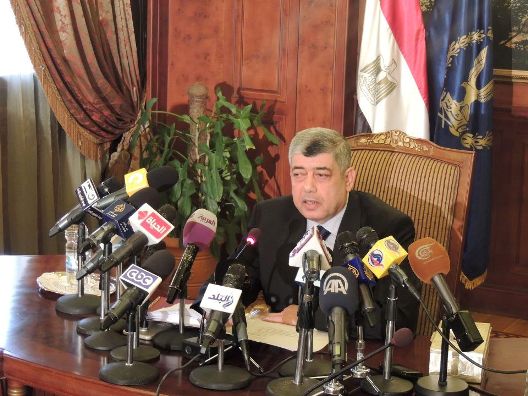 Since Mohamed Morsi’s ouster on July 3, comparisons to Algeria have been common, but they have been eclipsed by comparisons to the low-level insurgency Egypt itself witnessed in the nineties. The recent attempt to assassinate the current minister of interior, Mohamed Ibrahim, is a reminder of that past, and begs two questions – why did it happen and what can we expect in the future?
Since Mohamed Morsi’s ouster on July 3, comparisons to Algeria have been common, but they have been eclipsed by comparisons to the low-level insurgency Egypt itself witnessed in the nineties. The recent attempt to assassinate the current minister of interior, Mohamed Ibrahim, is a reminder of that past, and begs two questions – why did it happen and what can we expect in the future?
Since the eighties, Egypt has been witness to Islamist-led assassinations, from the shootings of former president, Anwar Sadat and liberal writer Farag Fouda, to failed attempts on the lives of Nobel laureate Naguib Mafhouz in 1994, and former ministers of interior, Zaki Badr, in 1989, and Abdel Halim Moussa, in 1990. One of four attempts on Moussa’s life resulted in the death of the speaker of the parliament Refa’at al-Mahgoub, with the attackers targeting his convoy in error. Beyond assassination attempts and attacks on government and police officials, bombings and civilian deaths punctuated the country’s recent history, most notably with the massacre of over sixty mostly tourists in Luxor in 1997.
Today, Sinai is seeing the same nineties tactics revived with ambushes and attacks on police and military installments on an almost daily basis. Egypt’s capital has also not been spared. The attempt on Ibrahim’s life is the most significant attack in Cairo, but the city has also had its share of ambushes, with shootings targeting ministry of interior personnel in Cairo suburbs including Heliopolis and Mohandeseen.
While Morsi’s supporters have been highly critical of the ministry of interior since his removal, the Brotherhood did not criticize the ministry’s performance during his rule. Morsi’s year in power included the targeting of activists and journalists, as well as police attacks on anti-Morsi protesters at the Presidential Palace in December 2012, and Christian protesters at the Coptic Orthodox Cathedral in April 2013. The Muslim Brotherhood’s official statements following the December and April clashes made no mention of the police, blaming instead the secular opposition for the violence. Continued calls to restructure the Ministry of Interior under Morsi went unheeded as the former president praised the ministry saying they were “at the heart of the January 25 revolution.”
As public dissent rose, police officers however began to come out in a show of support for the protests against Morsi. Police were seen participating, handing out bottles of water to the crowds or being carried on the shoulders of civilians, amidst chants of “The police and people are one hand.” After Morsi’s removal, with a crackdown underway against the Brotherhood and its supporters, the group’s rhetoric quickly changed. The organization condemned the police force’s use of violence, referring to the ministry as “military-installed.”
Since the violent dispersal of the pro-Morsi Raba’a al-Adaweya and Nahda sit-ins, the National Coalition to Support Legitimacy (NCSL), an umbrella group of Islamist parties calling for Morsi’s reinstatement, has failed to mobilize mass protests. Their main tool to impede the current roadmap is becoming ineffective, as they cling to their three main demands, and it leaves only more room for insurgency from among Morsi’s more extremist supporters. While the attack was instantly condemned by Freedom and Justice Party (FJP) member Amr Darrag as well as by the National Coalition to Support Legitimacy, Diaa al-Sawy, a leading member of the NCSL, went so far as to say that the attack was orchestrated by authorities to lend cover to an impending massacre.
There is no clear evidence pointing to who was behind the attack, which security forces have described as a suicide bombing. Prior to his removal, Morsi’s supporters themselves threatened the use of bombs in the event he was removed. The Islamist Jihad Group behind the assassinations of both Sadat and Fouda said the bombing bears the hallmarks of Hamas or al-Qaeda, while the Sinai-based Islamist militant group Ansar Bayt al-Maqdis claimed responsibility for it four days after the attack. Security sources have, however, have said that the claim could be an attempt to mislead authorities as it came days after the incident.
Regardless of who committed the attack, there are several implications that must be considered. The attack will likely result in more sweeping arrests by security sources, as the government continues to espouse its rhetoric of a war against terror. It will also feed into the general public’s anger towards Islamists, much of which is directed at the Muslim Brotherhood itself. It could also possibly lead to an extension of the state of emergency, with the one month deadline for its expiration on September 14 fast approaching.
To sum it up in one sentence, the main implication of the failed attack has only served to widen the gap between Egyptians and prolong the tense security period the country is currently facing. As the minister of interior himself put it, this is just the beginning.
Fady Salah is an Egyptian writer, journalist, political analyst, and author.
Image: Photo: Ministry of Interior
